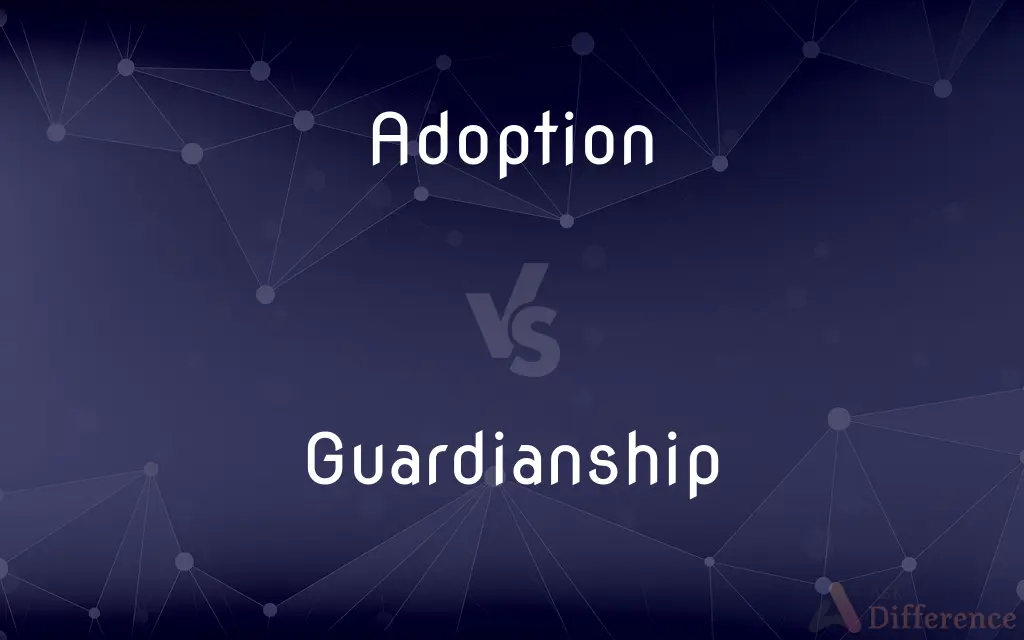Adoption vs. Guardianship — What's the Difference?
Edited by Tayyaba Rehman — By Urooj Arif — Published on July 29, 2024
Adoption permanently transfers all rights and responsibilities from the original parents to the adoptive parents. Guardianship is a temporary legal relationship where a guardian has rights to care for a child but does not terminate the parental rights.

Difference Between Adoption and Guardianship
Table of Contents
ADVERTISEMENT
Key Differences
Adoption involves a legal process that permanently changes the parent-child relationship; the adoptive parents become the legal parents with all parental rights and responsibilities. This means that once an adoption is finalized, the biological parents lose all legal rights and obligations regarding the child. On the other hand, guardianship establishes a legal relationship between a child and a guardian without severing the biological parents' legal rights. It's a more temporary arrangement, intended to provide care and decision-making for the child while keeping the biological parents' rights intact under certain circumstances.
In adoption, the child often assumes the family name of the adoptive parents and has the same legal rights as a biological child, including inheritance rights. Whereas in a guardianship, the child's legal relationship with their biological family remains largely unchanged. Guardians do not necessarily have the right to inheritance or other benefits that may be automatic through adoption.
The process of adoption is generally more rigorous and involves more extensive legal scrutiny than guardianship. Prospective adoptive parents often undergo home studies, background checks, and sometimes lengthy legal proceedings. Guardianship can be established more quickly and with less scrutiny, designed to serve the best interest of the child in a more immediate sense.
Adoption is considered a permanent solution intended to provide a child with a new permanent family when the biological parents are unable or unwilling to care for their child. On the other hand, guardianship is often seen as a temporary or reversible arrangement, which can be altered or terminated by the court if the child's circumstances change or if the biological parents are able to resume their parental responsibilities.
While adoption completely alters the legal relationship between a child and their parents, guardianship offers a flexible legal framework to ensure a child's needs are met without permanently altering the family structure. This flexibility can be crucial in situations where the child's parents are expected to resume care in the future.
ADVERTISEMENT
Comparison Chart
Legal Status
Permanent legal parent-child relationship established.
Temporary care and decision-making rights granted.
Parental Rights
Biological parents' rights are terminated.
Biological parents retain their legal rights.
Process
Involves a rigorous, often lengthy legal process.
Can be established more quickly, less scrutiny.
Relationship Change
Child often takes adoptive parents' surname, inherits rights.
No change in surname or inherent legal family rights.
Reversibility
Non-reversible, meant to be permanent.
Reversible or adjustable based on circumstances.
Compare with Definitions
Adoption
Adoption is the legal process by which a person becomes the lawful parent of a child.
They completed the adoption process last year and are now Emily's legal parents.
Guardianship
Guardianship is a legal mechanism for providing care to a child without adopting them.
She was granted guardianship of her niece, allowing her to make educational and medical decisions.
Adoption
Adoption grants a child the same rights as a biological child within the new family.
With his adoption finalized, he is entitled to inherit from his adoptive parents just like their biological children.
Guardianship
Guardianship does not terminate the biological parents' legal rights.
Even under guardianship, the child's parents can still have visitation rights and potential custody restoration.
Adoption
Adoption involves terminating the biological parents' legal rights.
Through adoption, they became his legal guardians, with his birth parents relinquishing their rights.
Guardianship
Guardianship is often used as a temporary solution.
Their guardianship arrangement is until the parents can resume responsibility.
Adoption
Adoptive parents undergo a thorough evaluation process.
Before the adoption, they underwent several home visits and background checks.
Guardianship
Guardians can make decisions for the child but don't have all the rights of parents.
As her guardian, he could enroll her in school and approve medical treatments.
Adoption
Adoption is permanent and irreversible.
Once the adoption decree is issued, it cannot be undone, making them her parents for life.
Guardianship
The process for establishing guardianship is generally less complex than adoption.
They were able to secure guardianship through a simpler court process.
Adoption
To take on the legal responsibilities as parent of (a child that is not one's biological child).
Guardianship
One that guards, watches over, or protects.
Adoption
To become the owner or caretaker of (a pet, especially one from a shelter).
Guardianship
One who is legally responsible for the care and management of the person or property of an incompetent or minor.
Adoption
The state of being adopted; the acceptance of a child of other parents as if he or she were one's own child.
A Chinese baby girl was given away for adoption.
Another Chinese boy was put up for adoption.
Guardianship
The responsibility of a guardian or keeper;
He left his car in my keeping
Adoption
The act of adopting, or state of being adopted; voluntary acceptance of a child of other parents to be the same as one's own child.
Adoption
The choosing and making that to be one's own which originally was not so; acceptance; as, the adoption of opinions.
Adoption
A legal proceeding that creates a parent-child relation between persons not related by blood; the adopted child is entitled to all privileges belonging to a natural child of the adoptive parents (including the right to inherit)
Common Curiosities
Is adoption more complicated than guardianship?
Generally, yes, because adoption involves a more thorough legal process, including terminating the biological parents' rights, which makes it more complicated and lengthier than establishing guardianship.
Can a guardianship turn into an adoption?
Yes, in some cases, a guardianship arrangement can lead to adoption if the biological parents are unable or unwilling to resume care, and all parties agree to the adoption.
What is the main difference between adoption and guardianship?
Adoption is a permanent arrangement where adoptive parents fully replace the biological parents in legal terms, whereas guardianship is a temporary legal arrangement that does not sever the child's legal ties to their biological parents.
Can guardianship be reversed?
Yes, guardianship is often reversible or subject to change based on the child's needs or a change in the biological parents' circumstances.
Do biological parents have any rights after adoption?
No, once an adoption is finalized, biological parents lose all legal rights and responsibilities regarding the child.
How does one become a guardian?
Becoming a guardian typically involves a court process where the proposed guardian proves that the guardianship is in the best interest of the child.
Do adoptive parents have the same rights as biological parents?
Yes, once an adoption is finalized, adoptive parents have the same legal rights and responsibilities as biological parents.
Can a child inherit from adoptive parents?
Yes, an adopted child has the same inheritance rights as a biological child within the adoptive family.
What rights do guardians have?
Guardians have the right to make decisions regarding the child's care, education, and health, but they do not have all the rights and responsibilities of a parent.
Why would someone choose guardianship over adoption?
Guardianship may be preferred in situations where the child's care needs to be legally established quickly or when the biological parents are expected to resume care in the future.
Can guardianship affect a child's surname?
No, guardianship does not typically involve changing the child's surname, unlike adoption, which often does.
Can adoption be done without the consent of the biological parents?
In some cases, adoption can proceed without the biological parents' consent if their rights have been legally terminated due to reasons like abuse or neglect.
What legal responsibilities do adoptive parents have?
Adoptive parents are responsible for providing for the child's physical, emotional, and financial needs, just as biological parents would be.
What happens to the biological parents' rights in a guardianship?
In a guardianship, the biological parents retain their legal rights, although their ability to exercise these rights might be limited or supervised.
Share Your Discovery

Previous Comparison
Ethylene Glycol vs. Diethylene Glycol
Next Comparison
New York vs. New JerseyAuthor Spotlight
Written by
Urooj ArifUrooj is a skilled content writer at Ask Difference, known for her exceptional ability to simplify complex topics into engaging and informative content. With a passion for research and a flair for clear, concise writing, she consistently delivers articles that resonate with our diverse audience.
Edited by
Tayyaba RehmanTayyaba Rehman is a distinguished writer, currently serving as a primary contributor to askdifference.com. As a researcher in semantics and etymology, Tayyaba's passion for the complexity of languages and their distinctions has found a perfect home on the platform. Tayyaba delves into the intricacies of language, distinguishing between commonly confused words and phrases, thereby providing clarity for readers worldwide.













































